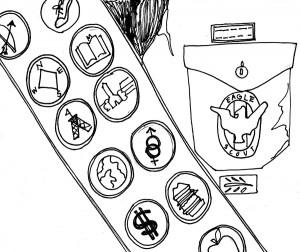Scouts’ new proposal hypocritical
Last Friday, the executive committee of the Boy Scouts of America proposed a change to its national policy that would lift an existing ban on openly gay scouts participating in the organization.
In an interview with CNN, the organization’s public relations director, Deron Smith, said that “if approved, the resolution would mean that ‘No youth may be denied membership in the Boy Scouts of America on the basis of sexual orientation or preference alone.’”
Though this is a positive step, the proposal would maintain the ban on openly gay adults serving as leaders, according to the New York Times. This continuing ban is a step back for the organization. The hypocrisy is evident: How can one manage to both be inclusive and exclusive at the same time?
The proposal will be put to an official vote in May at the organization’s national conference in Dallas. If approved, the policy will take effect at the beginning of 2014, according to CNN.
The road to approval, however, might be rocky.
In determining whether to put forth a proposal for policy change, the BSA’s executive committee conducted a survey of its members regarding their thoughts on the issue. The results of the survey indicated a generational split between the older adults, who generally supported a continued ban of openly gay members and leaders, and the younger parents and teenage members, who opposed the ban, according to CNN. According to the BSA’s official website, the organization is “one of the nation’s largest and most prominent values-based youth development organizations.”
Boy Scouts does, in fact, receive a great deal of its support from religious groups. Of its nearly 100,000 units operating a Boy Scouts program, 70.3 percent of these units are chartered to religious organizations and the most represented religious group is the Church of Latter-Day Saints, operating 37,856 total units, according to the BSA website.
Given the involvement of such a disproportionately large number of religious groups with traditional social values, it should not be surprising that the issue of whether to allow openly gay individuals to participate or lead in the Scouts is an especially contentious one.
Yet there’s no denying the increasing support for gay rights, rights that will only continue to become more entrenched within the national conscience as time passes, regardless of what the national board decides in May. Even if it does not happen this year, there should be no doubt that a more inclusive and just policy is in the near future for the Scouts.
Yes, the proposal is a step in the right direction, but it is also a plan dripping with hypocrisy. Accepting gay members as Scouts but rejecting anyone gay as unfit to be a leader ignorantly and nonsensically suggests that being gay is incompatible with the values of leadership and integrity as soon as a boy turns 18.
Richard Ferraro, vice president of communications for the Gay and Lesbian Alliance Against Discrimination, said in an interview with the New York Times, “What this resolution appears to be doing is reinforcing the outrageous idea that gay people somehow pose a threat to kids, which experts like the American Psychological Association have dismissed for more than a decade.”
And Jennifer Tyrrell, a lesbian woman who was dismissed as her son’s den leader last year, said in a statement: “One year after sending a letter ousting me as my son’s leader, the Boy Scouts are once again forcing me to look my children in the eyes and tell them that our family isn’t good enough.”
This new proposal is an obvious attempt by the Scouts to please both the socially conservative groups that fund it as well as the millions who oppose it.
Therefore, BSA should certainly be lauded for its step in the right direction. It is time, however, to complete that walk. Instead of tip-toeing around the issues, hoping that they just go away, BSA needs to proactively create a proposal with the goal of including all.
Families such as Tyrrell’s deserve the chance to live their lives as equally as any other so that, one day, Tyrrell can finally look her son in the eyes and tell him that their family is more than good enough.
They’re normal.
Sarah Cueva is a junior majoring in Middle East studies and political science. Her column “Homeland” runs Wednesdays.

